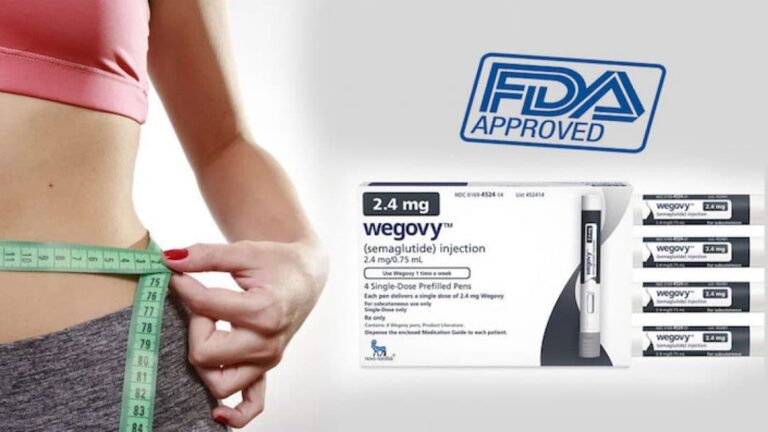
Weight loss injections are innovative treatments designed to support individuals dealing with obesity and weight-related health conditions. These injections are a non-surgical weight loss method, usually involving FDA-approved medications that target specific metabolic pathways to help reduce body weight. Effective weight loss injections often contain GLP-1 agonists, like Ozempic and Wegovy, which are known for their powerful effects on appetite suppression and metabolic regulation.
Typically prescribed for chronic weight management, these injections aim to assist those who have struggled with other weight loss approaches. They function by influencing hormones that affect appetite, metabolism, and energy levels, making it easier for individuals to lose weight without extensive lifestyle overhauls. For people battling obesity and weight-related health conditions, weight loss injections may provide a practical solution for achieving long-term, sustainable weight reduction.
Benefits of Weight Loss Injections
Weight loss injections offer a variety of benefits beyond just reducing numbers on the scale. Let’s explore the advantages these treatments bring to those seeking weight loss solutions.
1. Quick and Noticeable Results
One of the major benefits of weight loss shot options is the ability to deliver relatively fast results compared to traditional methods. Weight loss injections, like Wegovy and Ozempic, work by altering how the body responds to insulin and hunger hormones, enabling a more significant weight reduction. Patients may see initial results in as little as a few weeks, depending on their body’s response and their commitment to lifestyle changes. Injection treatments for obesity are especially useful for individuals who need results within a shorter timeframe for health or personal reasons.
2. Appetite Suppression and Craving Control
These injections play a crucial role in managing hunger by targeting specific hormones responsible for feelings of hunger and fullness. Appetite control injections, including hormone-based injections for weight loss, work by sending signals to the brain to suppress appetite, helping individuals reduce calorie intake naturally. This helps curb cravings and reduces the temptation to overeat, which is particularly helpful for people who struggle with emotional or habitual eating.
3. Boosting Energy for Physical Activity
Beyond curbing appetite, some metabolic support injections are designed to enhance energy levels, supporting individuals in maintaining an active lifestyle. Physical activity is a key component of effective weight management, and these injections make it easier for individuals to engage in regular exercise without feeling drained. Many weight loss injection plans incorporate Vitamin B12 or other energy-boosting injections to ensure the body is energized, which also contributes to burning more calories during activities.
4. Improving Metabolism with Hormone-Based Injections
One of the primary advantages of injection therapy for weight loss is its impact on metabolic rates. Some injections include hormone-like substances, such as GLP-1 agonists, that are known to boost metabolism, allowing the body to burn more calories even at rest. This enhancement in metabolic function, achieved through treatments like Liraglutide for weight control or Semaglutide injection for weight management, supports steady fat loss and helps overcome weight loss plateaus that can hinder progress in traditional weight management methods.
5. Reducing Risk of Obesity-Related Diseases
For those dealing with obesity, weight loss injections can reduce the risk of developing serious health issues, including type 2 diabetes, heart disease, and high blood pressure. Studies have shown that using injections like Ozempic and Wegovy, which are FDA-approved weight loss drugs, not only assists in achieving a healthier weight but also improves several weight-related health conditions. These medications contribute to better blood sugar control, reduced blood pressure, and overall improved cardiovascular health, making them an effective choice for people with obesity-related health risks.
Popular Weight Loss Injection Options
Several injections are available, each offering unique benefits for chronic weight management and weight reduction. Here are some of the most commonly prescribed prescription weight loss injections:
- Ozempic: Originally approved for diabetes management, this injection is effective for both blood sugar control and weight loss, especially in people with type 2 diabetes.
- Wegovy: Specifically approved for obesity treatment, Wegovy is popular for its effectiveness in reducing appetite and supp
- orting weight reduction.
- Saxenda (Liraglutide): Known for its impact on metabolism and appetite control, Saxenda helps individuals achieve sustainable weight loss without drastic lifestyle changes.
Each of these injections operates slightly differently, so choosing the best one requires a personalized evaluation by a healthcare provider who can assess individual health needs and goals.
Side Effects and Risks of Weight Loss Injections
Although weight loss medication options can be transformative, they also carry potential side effects and risks. Here are the most commonly reported side effects and considerations for those considering anti-obesity injections:
Common Side Effects of Weight Loss Injections
Many people experience mild side effects at the beginning of their injection treatment, including nausea, constipation, dizziness, and fatigue. These symptoms are typically temporary and subside as the body adapts to the medication.
Health Risks of Weight Loss Shots
While weight loss shots are safe when prescribed by a professional, there are some health risks to be aware of. In rare cases, medications like Wegovy or Ozempic can lead to serious side effects, including pancreatitis or kidney issues. Due to these risks, weight loss injections are generally recommended for individuals with a significant need for weight management.
Safety and Efficacy of Hormone-Based Injections
Since some hormone-based injections for weight loss impact insulin regulation and hormonal balance, they should be carefully monitored. People with pre-existing conditions, like thyroid disease or a history of endocrine disorders, should consult their doctors about the safest options for their needs. The potential risks underline the importance of using these injections only under medical supervision, especially with FDA-approved weight loss drugs.
Who Can Benefit from Weight Loss Injections?
Weight loss injections are typically prescribed for individuals with a BMI over 30, or those with a BMI of 27 or higher who also have weight-related health conditions, like type 2 diabetes or high blood pressure. For those looking to achieve significant weight reduction who haven’t found success with traditional methods, injections may provide the needed support. In cases of severe obesity, injections offer an opportunity for patients to regain control over their weight and improve their health outcomes significantly.
Conclusion
Weight loss injections offer a promising and non-surgical weight loss treatment for individuals struggling with obesity and related health conditions. These injections, including options like Ozempic, Wegovy, and Saxenda, work by suppressing appetite, enhancing metabolism, and promoting sustained weight reduction through injections. With the ability to lower health risks such as diabetes and obesity-related complications, these injections provide a comprehensive approach to chronic weight management.
If you’re considering prescription weight loss injections, consult with a healthcare provider to ensure the treatment aligns with your health needs and weight loss goals. Weight loss injections are not standalone solutions; for best results, they should be part of a holistic approach that includes a balanced diet and regular exercise
Frequently Asked Questions
Are weight loss injections effective for everyone?
Not necessarily. Injection treatments for obesity are generally more effective for people with high BMIs or weight-related health conditions. Results vary, and injections work best when paired with a balanced diet and physical activity.
What should I expect in terms of results?
Results depend on individual factors like metabolism, lifestyle, and the specific injection type. Most individuals see noticeable weight reduction through injections within three to four months.
Is it safe to use long-term weight loss injections?
These injections are FDA-approved for long-term use in people who need ongoing weight management. However, patients must be monitored regularly to effectively manage potential health risks.
Do weight loss injections replace diet and exercise?
No. While injections help control appetite and improve metabolism, they are most effective when combined with a balanced diet and regular physical activity.















